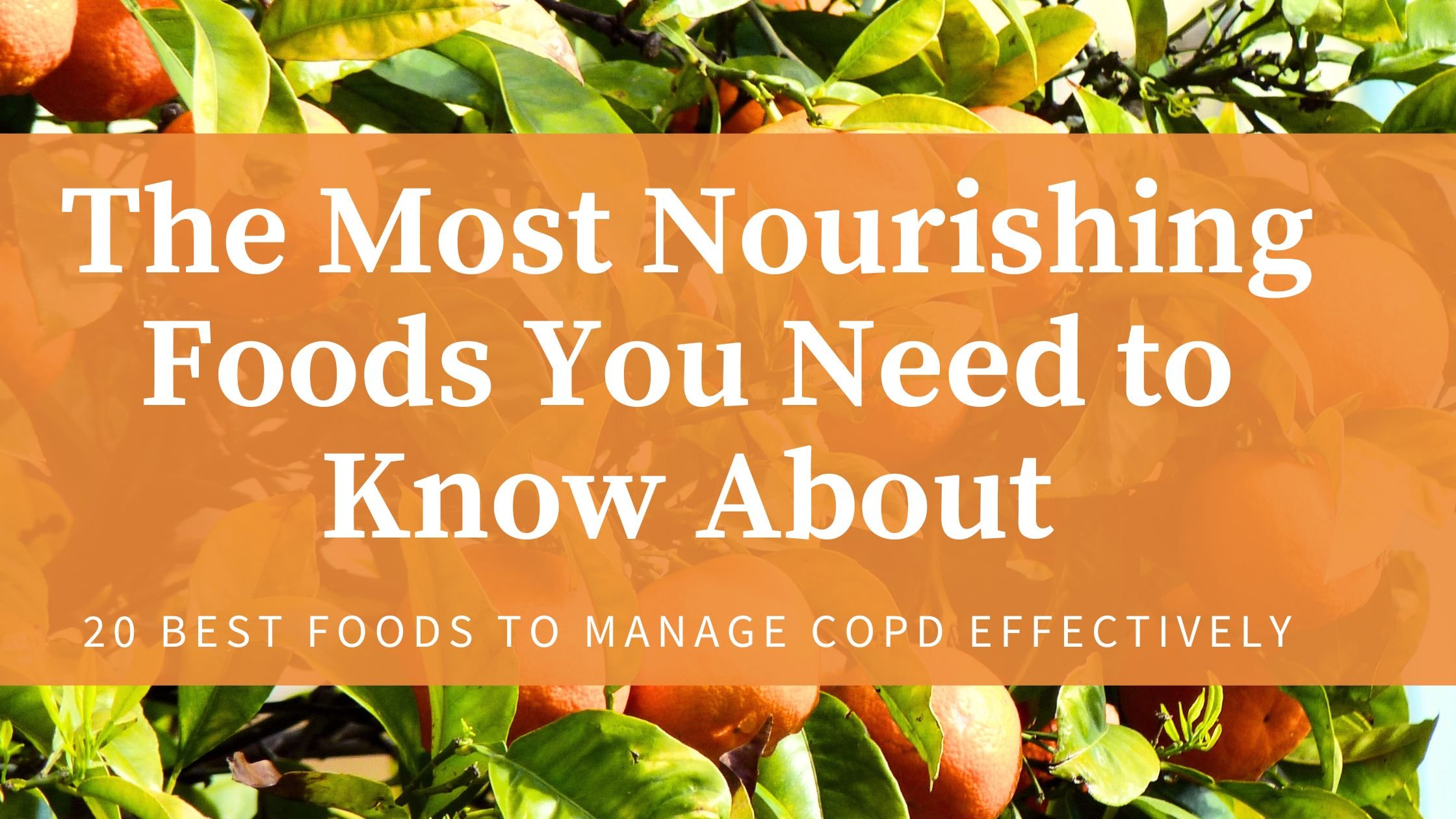
Living with Chronic Obstructive Pulmonary Disease (COPD) requires careful attention to diet to support lung function and overall well-being. A well-balanced diet rich in specific nutrients can significantly aid in managing COPD symptoms and enhancing respiratory health. In this article, we will explore the top 20 foods that have proven to be beneficial for individuals with COPD.
Embarking on a journey toward optimal COPD management involves more than just a mere selection of foods; it necessitates a comprehensive understanding of the intricate relationship between nutrition and respiratory well-being.
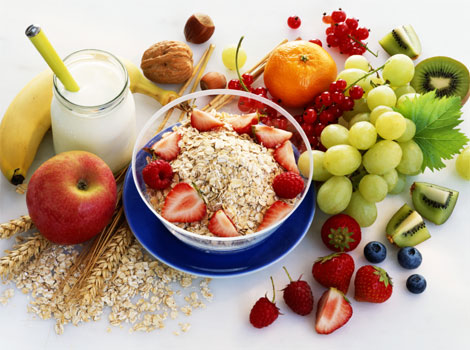
In the following sections, we delve into each food choice with meticulous scrutiny, unraveling its nutritional composition and unveiling the compelling rationales behind its profound influence on the health of your lungs.
Each food choice is accompanied by an in-depth analysis of its nutritional profile and the reasons behind its positive impact on respiratory health.
-
Fatty Fish (Salmon, Mackerel, Sardines): Fatty fish are abundant in omega-3 fatty acids, known for their anti-inflammatory properties. Omega-3s have been shown to reduce inflammation in the airways, improving lung function and reducing the risk of exacerbations in COPD patients. Additionally, these fish provide a good source of protein, which aids in maintaining muscle mass, crucial for respiratory support. 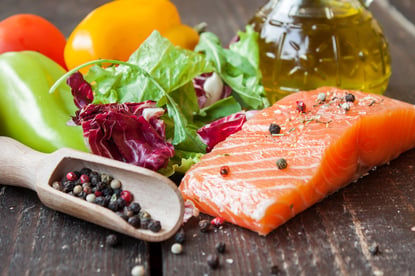
-
Leafy Greens (Spinach, Kale, Swiss Chard): Leafy greens are rich in antioxidants, such as vitamins C and E, which can help protect lung tissue from oxidative stress. These greens are also high in magnesium, which supports proper muscle function, including the muscles involved in breathing.
-
Berries (Blueberries, Strawberries, Raspberries): Berries are packed with antioxidants that can help reduce inflammation and oxidative damage in the lungs. They are also a great source of dietary fiber, promoting digestive health and aiding in weight management, an important consideration for COPD patients.
-
Nuts and Seeds (Almonds, Flaxseeds, Chia Seeds): Nuts and seeds contain vitamin E, a powerful antioxidant that helps protect lung cells from damage. They also provide healthy fats and protein, which contribute to overall energy levels and support muscle function. 
-
Whole Grains (Quinoa, Brown Rice, Whole Wheat): Whole grains offer a steady supply of energy and dietary fiber, aiding digestion and maintaining stable blood sugar levels. This can help COPD patients manage weight and energy levels effectively.
-
Lean Proteins (Chicken, Turkey, Lean Beef): Lean meats are excellent sources of protein, vital for maintaining muscle mass and strength. Adequate protein intake helps support respiratory muscles, which are essential for breathing.
-
Beans and Legumes (Lentils, Chickpeas, Black Beans): Beans and legumes are rich in potassium and magnesium, minerals that support lung function and help maintain electrolyte balance. They also provide a good source of plant-based protein and fiber.
-
Citrus Fruits (Oranges, Grapefruits, Lemons): Citrus fruits are high in vitamin C, a potent antioxidant that supports the immune system and may help reduce respiratory symptoms. 
-
Avocado: Avocado is a healthy source of monounsaturated fats, which can contribute to reduced inflammation in the body. It also provides potassium, which supports lung function and fluid balance.
-
Carrots: Carrots are rich in beta-carotene, a precursor to vitamin A, which plays a role in maintaining lung health and reducing respiratory infections.
-
Sweet Potatoes: Sweet potatoes are high in vitamin A and potassium, both of which are beneficial for respiratory health. Vitamin A is essential for maintaining the integrity of lung tissues.
-
Ginger: Ginger has anti-inflammatory properties that can help alleviate respiratory symptoms and improve lung function. It may also provide relief from congestion. 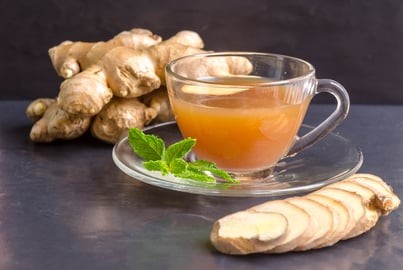
-
Garlic: Garlic contains allicin, a compound known for its potential to enhance immune function and reduce inflammation. It may help reduce the frequency of respiratory infections.
-
Turmeric: Turmeric contains curcumin, a compound with anti-inflammatory and antioxidant properties. It has the potential to improve lung function and reduce COPD-related inflammation.
-
Broccoli: Broccoli is rich in vitamins C and K, as well as sulforaphane, a compound that may help reduce inflammation and support lung health.
-
Oats: Oats are a great source of dietary fiber, which aids in digestion and weight management. They also provide essential nutrients for overall health. 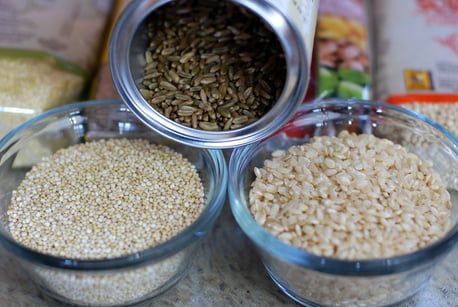
-
Yogurt (Probiotic-rich): Probiotic-rich yogurt supports gut health, which in turn can have positive effects on the immune system and reduce inflammation.
-
Green Tea: Green tea contains catechins, antioxidants that may help improve lung function and reduce respiratory symptoms.
-
Pumpkin Seeds: Pumpkin seeds are high in magnesium, zinc, and healthy fats, which contribute to immune function and respiratory health. 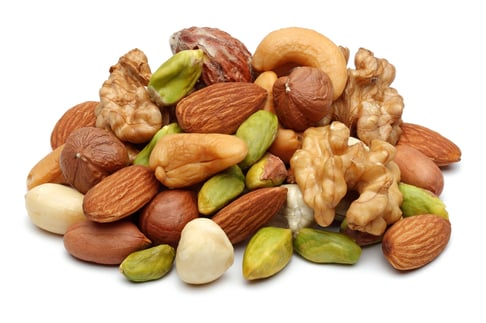
-
Water: Staying hydrated is crucial for thinning mucus and maintaining optimal lung function. Drinking enough water helps prevent airway constriction and supports overall respiratory health.
Foods to Avoid
While a COPD-friendly diet involves many beneficial choices, there are some foods that individuals with COPD should limit or avoid due to their potential to worsen symptoms.
These include processed foods high in trans fats, sodium, and sugar, as well as fried foods. These can contribute to inflammation, fluid retention, and weight gain, all of which can exacerbate COPD symptoms.

Incorporating a well-rounded diet rich in these 20 foods can have a significant impact on managing COPD effectively. By focusing on nutrient-dense options that reduce inflammation, support immune function, and provide essential vitamins and minerals, individuals with COPD can take an active role in promoting their respiratory health and overall well-being.
Remember to consult with a healthcare professional or registered dietitian before making significant changes to your diet, especially if you have any underlying health conditions.
Gut Health and Respiratory Diseases: A Symbiotic Relationship

The gut and lungs might seem like distant anatomical neighbors, but mounting evidence suggests that their health is intricately connected. A well-functioning gut is home to a diverse community of microbes that play a vital role in digestion, metabolism, and immune function.
Emerging research reveals that these gut microbes also have a profound impact on the immune response within the lungs.
A disrupted gut microbiome, characterized by an imbalance between beneficial and harmful bacteria, may contribute to chronic inflammation throughout the body, including the lungs.
In individuals with COPD, this inflammation can exacerbate respiratory symptoms and increase the risk of exacerbations. Consuming foods rich in dietary fiber, like whole grains, beans, and legumes, can promote a diverse gut microbiome and help modulate inflammation, thereby supporting lung health.
The Role of Nutrition and Healthy Weight in COPD Management

Maintaining a healthy weight is a cornerstone of effective COPD management. COPD places increased metabolic demands on the body, as the act of breathing itself requires extra energy expenditure. Weight loss and muscle wasting are common among individuals with COPD and can lead to decreased respiratory muscle strength, compromised lung function, and reduced exercise tolerance.
Top 20 Foods for Respiratory and Gut Health in COPD: A Nutrient Breakdown
-
Fatty Fish: Omega-3 fatty acids reduce lung inflammation, while protein supports muscle mass essential for breathing.
-
Leafy Greens: Rich in antioxidants like vitamins C and E, as well as magnesium, for lung tissue protection and muscle function.
-
Berries: Antioxidants and fiber combat oxidative stress and inflammation, aiding digestive health.
-
Nuts and Seeds: Vitamin E and healthy fats support lung cells and muscle function.
-
Whole Grains: Stable energy levels and fiber for weight management.
-
Lean Proteins: Vital for maintaining muscle mass and respiratory muscle strength.
-
Beans and Legumes: Potassium and magnesium support lung function and fluid balance.
-
Citrus Fruits: Vitamin C enhances immunity and may reduce respiratory symptoms.
-
Avocado: Monounsaturated fats and potassium support lung health and fluid balance.
-
Carrots: Beta-carotene and vitamin A contribute to lung tissue integrity.
-
Sweet Potatoes: Rich in vitamin A and potassium for respiratory health.
-
Ginger: Anti-inflammatory properties aid respiratory symptom relief.
-
Garlic: Allicin supports immunity and reduces inflammation.
-
Turmeric: Curcumin reduces COPD-related inflammation and supports lung function.
-
Broccoli: Vitamins C and K, plus sulforaphane, reduce inflammation and promote lung health.
-
Oats: Fiber aids digestion and weight management.
-
Probiotic-rich Yogurt: Supports gut health, impacting overall immunity and inflammation.
-
Green Tea: Catechins may enhance lung function and reduce symptoms.
-
Pumpkin Seeds: Magnesium, zinc, and healthy fats support immunity and lung health.
-
Water: Hydration thins mucus and maintains lung function.

The Significance of Maintaining a Healthy Weight

A COPD-friendly diet goes hand-in-hand with maintaining a healthy weight. Adequate nutrition prevents weight loss and muscle wasting, both of which can compromise respiratory muscle strength and lung function. In fact, studies have shown that individuals with a higher body mass index (BMI) tend to have better lung function and are more resilient to respiratory infections.
Conclusion
The connection between gut health, nutrition, and COPD management is a fascinating area of research that highlights the importance of a holistic approach to respiratory well-being.
By incorporating a diverse array of nutrient-rich foods, individuals with COPD can promote gut health, reduce inflammation, and support lung function. Moreover, maintaining a healthy weight through proper nutrition plays a pivotal role in enhancing overall respiratory capacity and quality of life.
Always consult with healthcare professionals or registered dietitians to tailor dietary choices to your specific needs and medical history, ensuring the best possible outcomes for managing COPD effectively.
Living with COPD presents a unique set of challenges, but a well-informed approach to nutrition can greatly improve one's quality of life. The interplay between respiratory health and gut health is a burgeoning area of research that highlights the importance of a holistic approach to COPD management.
In this article, we will dove into the 20 best foods for COPD, exploring their role in both respiratory and gut health. Furthermore, we discussed in detail why maintaining a healthy weight is a vital component of most COPD treatment plans.















